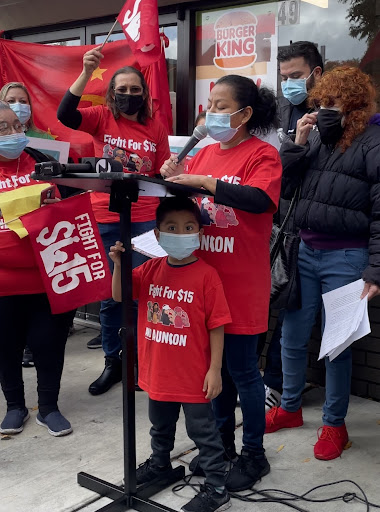Photo: Protesting workers at the San Jose action
California fast-food workers went on strike on Nov. 9, walking off the job for a day in at least five major cities including Sacramento, Oakland, San Diego, San Jose and Los Angeles. Since the start of the pandemic, workers have led strikes at over 300 locations to organize and win safety and justice on the job.
Fast food workers are also organizing for AB 257, landmark legislation in California which would create Fast Food Sector Councils to give workers a voice on the job and the ability to hold their own employers accountable. AB 257 fell several votes short earlier in the year, but there is an opportunity to pass it again in January 2022.
In San Jose, fast food workers organizing with Fight for $15, a Service Employees International Union campaign, led a rally in front of Burger King where several workers gave testimony about the horrible conditions they face on the job. Several workers spoke about their experience with wage theft, violence — including the trauma of having guns pointed at them — health and safety violations, sexual harassment, racism, retaliation for speaking out and much more. To show just how little this system cares about our “essential workers” during the pandemic, some fast food workers were given doggy diapers to wear as masks. Among record breaking temperatures, fast food workers often find themselves having to work without air conditioning, sometimes resulting in heat illness and passing out on the job.
Because many fast food workers are undocumented, management regularly threatens to call ICE on those who speak out and try to organize. Speakers at the rally expressed their exasperation about just how common all of these occurrences are.
Rosa Vargas, a fast food worker and member of Fight for $15, shared her story: “In July, I had a serious fall on the job that required me to get several stitches on my right and left leg. They did not pay me for the time off I had to take to heal from this injury. When I returned, I told my manager after working in a standing position for four hours that I thought I was going to fall from the pain. She did not even look me in the eyes when I said it; she ignored me and kept counting the money. The managers and executive directors of fast food chains do not seem to care at all about our lives.”
An important call repeated throughout this action was: “Which side are you on?” — calling on people to stand with the workers over global corporations. The workers recognize that the record profits these companies are seeing are due to their labor and come at the cost of their health and safety. The bold action by these fast food workers shows what we can do when we recognize our power, join together and take collective action.
These struggles highlight the inhumane nature of a system that allows employers to pay their workers starvation wages and deny them healthcare and sick days, while the CEO and shareholders see their wealth pile up by the millions and billions. These strikes are a result of a system that exploits, devalues and dehumanizes the working class.






